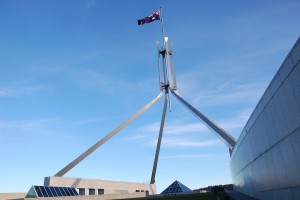Treasurer Joe Hockey could soon become known as the Robin Hood of revenue restoration after his second Budget took delivered a centrepiece of hitting big business tax avoidance while doling out a suite of incentives including new tax breaks and write offs for small businesses, start-ups and fledgling enterprises – and a slug of new money for child-care.
The hard rhetoric of a Budget emergency that surrounded last year’s swag of cuts that spooked voters and almost toppled the Prime Minister Tony Abbott’s leadership of the government has also been dumped in its entirety, replaced by a conspicuous ‘care factor’ that sells itself on pumping money into where it’s needed most to create new jobs and economic growth.
The deficit for 2014-15 has come in at a gaping $41.1 billion and is forecast to ease back to $35.1 billion in 2015-16, a long stretch away from the loft ambitions of the Abbott government’s first budget. Instead there is a “credible path to surplus.”
“Look at the glass half full,” Mr Hockey boomed during the Budget lock-up press conference, adding that he wanted people to spend and to “have a go”.
The Budget’s two centrepieces are a $5.5 billion ‘Growing Jobs and Small Business’ package and a simplified and more generous childcare subsidy system that at first blush aims to clean up the mish-mash of different subsidies and benefits that have driven parents to the brink of administrative despair for more than a decade.
Under the small business package, the money — rather typically – fows in the form of revenue expenses in the form of tax cuts to the tune of $3.25 billion and $1.75 accelerated depreciation measures.
More specifically, from 1 July the company tax rate for around 780 incorporated businesses that turn over less than $2 million a year get a 1.5 per cent cut to drop their tax rate from 30 per cent to 28.5 per cent.
Also from July 1 unincorporated businesses turning over less than $2million (reckoned to be around 1.5 million sole traders and partnerships) get a 5 per cent tax discount via their tax return, which is capped at $1000.
On the child care front — which the government clearly sees as an unnecessary handbrake on workforce participation and jobs growth needed to help revive PAYG tax receipts — the major movement is the rationalisation of at least three benefits into one in the form of a new Child Care Subsidy.
That means that from 1 July 2017 the new benefit will replace the existing Child Bare Benefit, Child Care Rebate and Jobs Education and Training Child Care Fee Assistance Programme.
Under the new Child Care Subsidy, families with an income of $65,000 or less get 85 per cent of their child care fees subsidised (with an hourly rate cap) tapering away to a 50 per cent for families earning $170,000 a year or more.
Some of that extra money could be needed to offset what is likely to be a 10 per cent increase in the price of digital products that have so far largely avoided the application of the GST.
“Australian based businesses must currently account for GST on sales of digital products and services, but their overseas counterparts do not unless their supply is performed in Australia.” The Budget papers say.
“Under new arrangements, these anomalies will be removed and Australia’s taxation system will take another step into the 21st century.”
Notably, some of the services in the frame for the new application of the GST listed in the Budget papers include legal and consulting advice.
However going after tax cheats to get money costs money, especially at the Australian Taxation Office (ATO) which has been bleeding thousands of staff to meet its efficiency dividend targets.
To that extent the ATO gets a $87.6 million “to continue the International Structuring and Profits Shifting Programme” as well as “additional funding to … to assist with their investigations.”
There’s little doubt that money will be needed given that the Abbott government has vowed to go after the likes of Apple, Google and Microsoft via a new “Multinational Anti-Avoidance Law” set top take effect from 1st January 2016.
Official estimates of what the new law might claw back are necessarily thin on the ground, however the Budget papers say the government has around 30 multinationals under suspicion of diverting profits using artificial structures to dodge tax.
Tax avoiders busted on the new law stand to lose plenty, with the Budget papers stating that “where the law applies, multinationals will be subject to the government’s new doubled penalty regime for tax avoidance and profit shifting scheme.”
“This means that not only will tax avoiders need to pay the tax they owe, they will also face penalties of up to 100 per cent of the tax they owe and interest.”






Leave a Reply